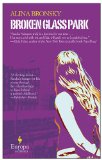Summary | Excerpt | Reading Guide | Reviews | Beyond the Book | Readalikes | Genres & Themes | Author Bio

The next day she was in all the papers. Her first name and the first initial of her last name—as is the journalistic tradition here—along with her age and a photo. It was a picture he’d had taken with her theater group, a nice picture, her hair red, her face less covered with makeup than usual, a black sweater.Back in those days she’d been a star.
Are you happy now? I asked the picture. Didn’t I warn you? How could you let this happen? Why did you marry that asshole? Why did he get to come with you to Germany? Why in the hell did you let him into the apartment that night?
Why? For god’s sake why?
You were always a stupid, stupid, stupid woman, I said to her. But how could you do this to me—how could you possibly have been so dumb?
Later I apologized to her. Obviously it wasn’t her who had done this to me. She had just acted the way she always did—she couldn’t help it. She was, after all, an art history student and an artist to boot. She was of an archetype that doesn’t really exist anymore—a bit more cosmopolitan, a bit more skilled, a bit more refined. And I’ll explain that in my book so everyone knows it. I don’t want her to be famous only because she died such a horrid death.
Right from the beginning, I read all the newspaper reports. I would always run down to the newsstand and buy copies of all the papers they sold there. The first few days we weren’t at home—the department of family services put us up in an apartment owned by the city. But after two days I told them we couldn’t take it anymore. The apartment was completely free of dust, of books, of life. And there was a plastic plant. I said the little kids wanted to go home. It was most important for Alissa. She wasn’t even two years old.
We were permitted to go home, where everything was oddly clean in a way it had never been before. We were looked after around the clock by several indistinguishable women with short hair and hyphenated names, and one man with long hair—who also had a hyphenated name.
I can barely remember those days. I just know I talked nonstop about how we had done things before and how we needed to keep doing them that way now. How they shouldn’t buy any food other than the things we were already used to. Then one day there was organic butter on the table, and I just had a complete breakdown.
I can still remember the look one of the women gave me as I fell screaming to the floor. There was relief in that look. They had been droning on for days about how I didn’t need to keep it all inside. How I could give my feelings free rein. Vent. I needed to, in fact.
But I didn’t listen to them.
And then suddenly Maria arrived. Cousin twice-removed, with three overstuffed suitcases brought from Novosibirsk. A chance for the traumatized children to form a family again. Vadim’s cousin, by the way.
I had agreed to her coming—after the experience in the family services-owned apartment, I had an allergic reaction to the idea of entering any kind of institutional facility. And foster parents weren’t exactly lined up around the block to take in three emotionally fucked up urchins of Russian origin. Or to move into the apartment where the half-orphans were huddled in the freshly vacuumed corners like frightened rabbits. The apartment with the door that had recently had more pictures snapped of it than Heidi Klum.
So Maria it was.
Maria is in her mid-thirties but looks fifty. She used to work in a factory cafeteria in Novosibirsk. Maria has calloused hands as big as shovels, with nails painted red. She has short hair, dyed blond and permed, thick legs with varicose veins— though you can’t see them under the wool stockings she wears. She’s got a dozen floral-print dresses, an ass so wide you could land a helicopter on it, perfume so sickly-sweet it makes you sneeze, a big mouth ringed with red lipstick, chipmunk cheeks,
and little eyes.
Excerpted from Broken Glass Park by Alina Bronsky. Copyright © 2010 by Alina Bronsky. Excerpted by permission of Europa Editions. All rights reserved. No part of this excerpt may be reproduced or reprinted without permission in writing from the publisher.
Your guide toexceptional books
BookBrowse seeks out and recommends the best in contemporary fiction and nonfiction—books that not only engage and entertain but also deepen our understanding of ourselves and the world around us.